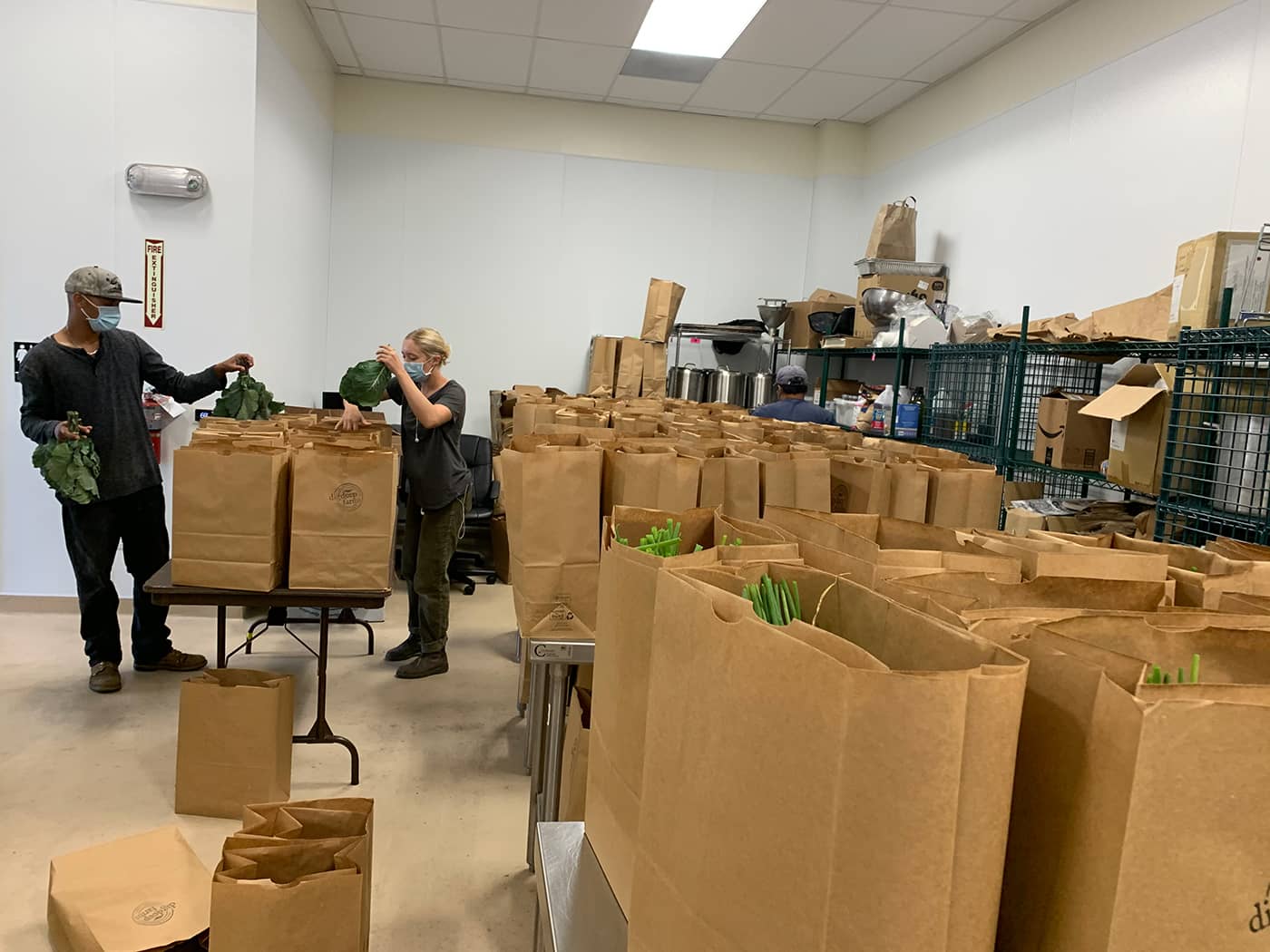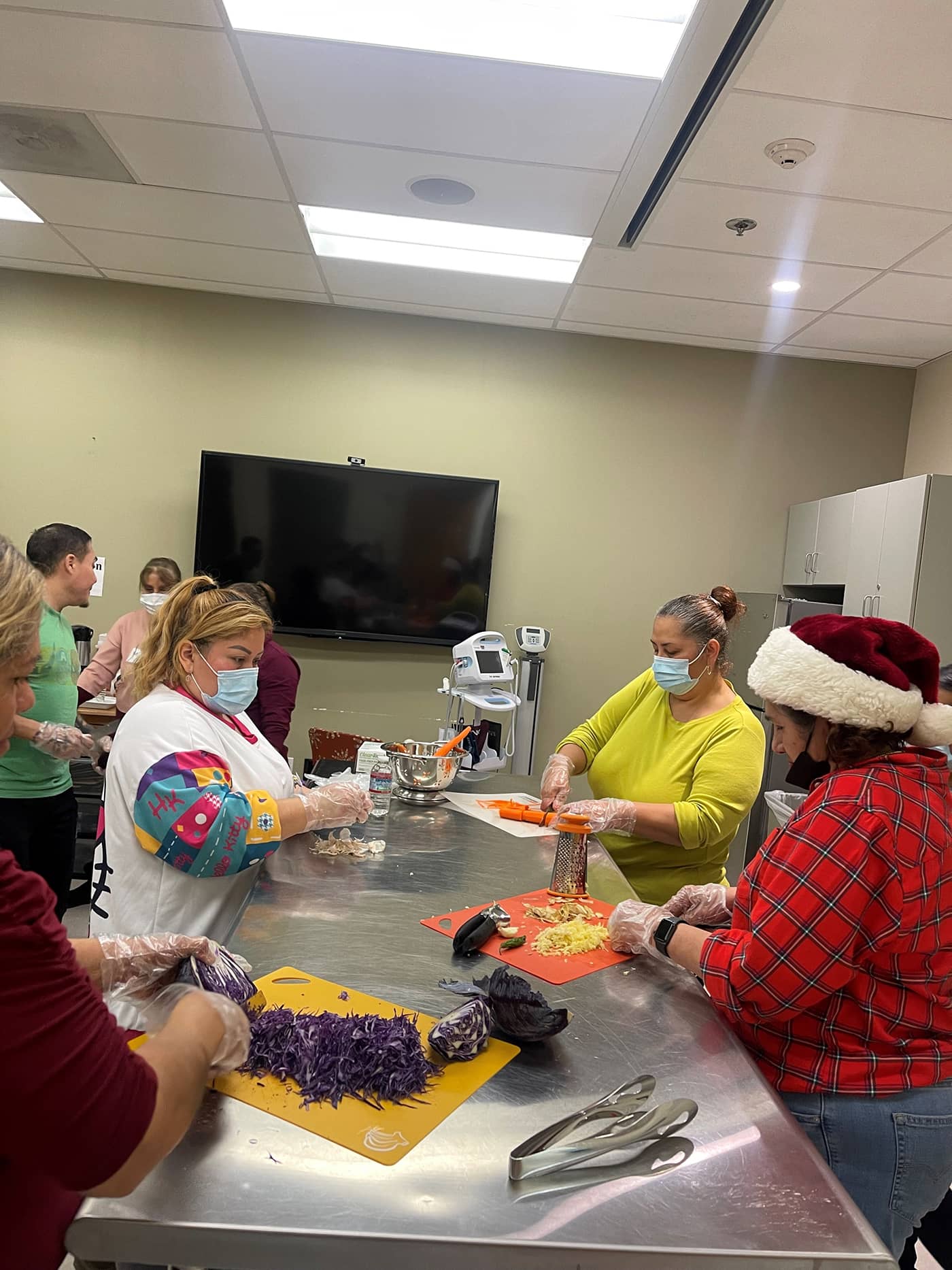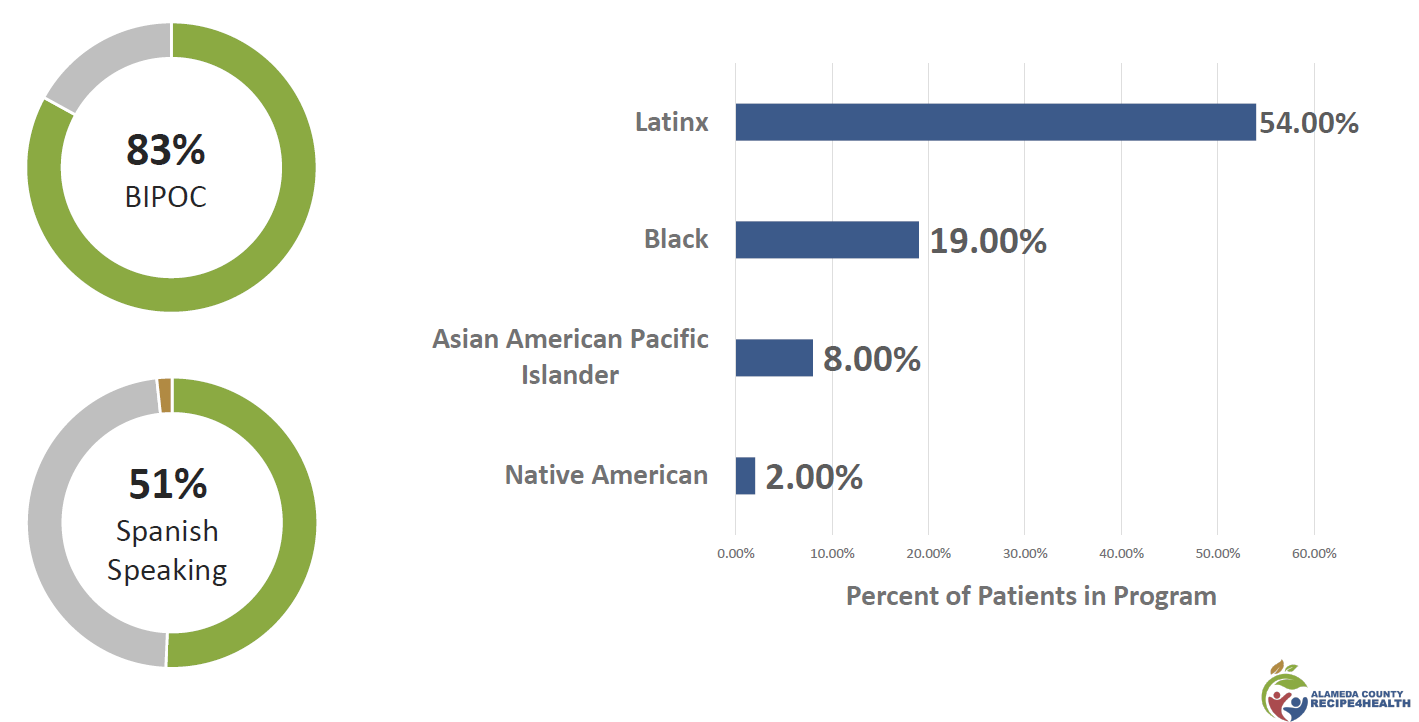Training and Administration Hub
Takes on the responsibility of implementation to support participating clinicians, health coaches, farmers, and food hubs to provide a seamless service to patients and communities.
Local Food
Answers the question, “Where does the food for FIM come from?” and is a health multiplier that yields benefits to human health, economic health, soil/climate health, and equity.
Policy Leadership
Encourages legislation to mandate coverage of Medically Supportive Food and Nutrition supports and continues to help shape policy to broaden access to FIM interventions.
Bright Spots Profile
Recipe4Health (R4H) is a nationally recognized, clinically integrated Food Is Medicine (FIM) model that enables health care teams in Federally Qualified Health Centers (FQHCs) to prescribe patients with regenerative and organic produce and health coaching to prevent, treat, and reverse chronic health conditions and food insecurity.
Based in Alameda County, California, and housed within the local health agency, Alameda County Health, R4H works with a hyperlocal farm led by Black Indigenous People of Color (BIPOC) and a broader network of local organic farms and uses trauma-informed, culturally competent BIPOC health coaches to serve communities that are primarily composed of people of color.
R4H was included in the Bright Spots series to highlight an equity-driven organization transforming health care and agriculture, provide representation of FQHCs in the FIM landscape, and highlight how other FIM implementers may influence policy and leverage additional funding streams when providing FIM services.
The effort that would eventually become R4H started in 2016 by Dr. Steven Chen, a medical director at Alameda Health System’s Hayward Wellness FQHC facility. The small-scale FIM initiative was designed to serve local populations. This initiative gained the attention of the late Supervisor Wilma Chan, a member of the Alameda County Board of Supervisors, who in 2019 recruited Dr. Chen to scale the FIM initiative across Alameda County within ALL IN, a county initiative working to end poverty.
After some time, the initiative became Recipe4Health and became a covered service under California’s Medicaid program, Medi-Cal, through California Advancing and Innovating Medi-Cal (CalAIM), which is California’s Medicaid 1115/In Lieu Of Services/1915b demonstration project.
Key Components
R4H uses five key components, termed ingredients, to serve patients and local communities. Those components are:
- FQHCs
- Food Farmacy
- Behavioral Pharmacy
- Medicaid Managed Care Health Plan to fund services
- R4H Training and Administrative Hub
FQHCs Provide Comprehensive Primary Health Care Services
R4H collaborates with FQHCs and their network of clinics in Alameda County, California to bring FIM interventions to local communities. These FQHCs, such as Alameda Health System’s Hayward Wellness Center, Bay Area Community Health, Lifelong Medical Care, Native American Health Center, and Tiburcio Vasquez Health Center, primarily provide health care services to communities of color that are underserved.
R4H works with FQHC C-suite leaders to ensure executive alignment, and with clinic leadership teams and front-line staff to operationalize the program best suited for the capabilities and limitations of each local clinic. FQHCs in Alameda County are trusted, community-led, patient-directed organizations working upstream to address food insecurity and downstream to address chronic health conditions.
Food Farmacy Supplies Patients with Local Produce
R4H partners with a hyperlocal, BIPOC-led farm and a broader network of local organic farms to supply doorstep delivery of organic, regeneratively grown produce to patients weekly for a period of 12 weeks. R4H prioritizes the provision of organic and regenerative produce to supply nutrient-dense foods and to promote soil health, which will benefit the environment and ensure long-term sustainability of the food system. R4H centers equity by creating local, living wage jobs and by partnering with BIPOC farmers who have historically been excluded from agricultural opportunity.
Behavioral Pharmacy Educates Patients About Healthy Nutrition and Lifestyle Habits
As part of its FIM intervention, R4H provides up to 12 weeks of patient-centered and fully interactive group or individual health coaching, in complement to food provided. These sessions are led by community-based health coaches through Open Source Wellness to educate patients on nutrition, stress reduction, physical activity, and social connection with the goal of promoting and sustaining behavioral change. During group sessions, patients are encouraged to communicate with each other and exchange culturally unique recipes to build community. Many former patients have become peer coaches to continue their involvement with R4H.
Medicaid Managed Care Health Plan Covers Services
R4H funds its FIM interventions for patients. Patients with a wide variety of chronic health conditions (e.g., diabetes, hypertension, depression, and others) are covered under CalAIM. Individuals who are food insecure but lack chronic health conditions are covered through R4H directly with funding support from other R4H funders.
R4H Training and Administrative Hub Supports FQHCs
R4H provides back-end training and administrative support for participating FQHCs and their providers to reduce the burden of implementing FIM interventions for those health clinics.
R4H support includes:
- Workflow integration with the electronic health record (EHR) systems
- Clinical nutrition training for physicians, nurse practitioners, mental health professionals, medical assistants, nutritionists, and other providers
- Medicaid authorization and claims management to enable funding of R4H services
R4H staff also meet with implementers biweekly to monthly to gather feedback and improve R4H’s program design. This back-end support has enabled R4H to get its FIM interventions off the ground and into health clinics quickly.
Benefits to Patients
The graphic below illustrates the populations that have participated in the R4H program so far. 83 percent of participants are BIPOC and 51 percent are Spanish speaking.
R4H has provided over 80,000 bags of produce (equating to over 1.3 million servings) to more than 6,200 patients, 83 percent of whom are BIPOC. Patients who received R4H services experienced the following benefits:
- Increase in daily fruit and vegetable intake by 0.8 servings
- Increase in moderate to vigorous physical activity by 39 minutes per week
- Improvement in food security by 24 percent measured by a 6-item questionnaire
- Reduction of Hemoglobin A1C levels by at least 0.5 in 32 percent of patients
- Reduction in total cholesterol, LDL (low-density lipoprotein) cholesterol, or triglycerides by at least 10 percent in 66 percent of patients
- Improvement in total depression scores (using the PHQ-9 questionnaire) by at least 1 category (from moderately severe to moderate) for 44 percent of patients
- Improvement in total anxiety scores (using the GAD-7) by at least 1 category (from moderate to mild) for 32 percent of patients
- Decrease in the likelihood of presenting to the emergency room by 15 percent relative to control groups
Measuring Outcomes
R4H architected a data ecosystem with partner FQHCs, Food Farmacy service partners, Behavioral Pharmacy partners, and the Medicaid managed care plan, to compile patient data relating to FIM interventions. These data include referral data, authorization data, tracking of services, and claiming. R4H integrates this data with EHR metrics around clinical biomarkers and vital signs from the EHRs in accordance with HIPAA and data use agreements.
R4H has partnered with Stanford University and the University of California, San Francisco to analyze patient outcomes and inform further developments of R4H strategies. This collaboration seeks to create a system to collect information from referrals, authorization, and service utilization via EHRs and health plans. These data can then be connected to patient biomarker information to provide a more comprehensive understanding of the impact of R4H services on patient health.
Blended Funding Sources
R4H has leveraged multiple funding services across its lifetime. The initiative received its first grant of $30,000 from Kaiser Permanente in 2016, before the initiative became R4H or part of ALL IN. In addition to Medi-Cal coverage through CalAIM for FIM interventions, R4H has received funding from the U.S. Department of Agriculture’s (USDA) Gus Schumacher Nutrition Incentive Program, the National Institute on Minority Health and Health Disparities, the Hunger To Health Collaboratory, Hellman Foundation, Stupski Foundation, and Rockefeller Foundation.
Challenges Faced by R4H
R4H is currently grappling with the lack of service coverage for two groups of its patients. While CalAIM covers FIM interventions for patients with certain chronic health conditions, those who are solely food-insecure and do not have those conditions are not eligible for CalAIM’s benefits. Reimbursement for FIM interventions is also limited to members of Medicaid managed care plans who have opted into CalAIM.
Given that food insecurity is associated with the increased likelihood of developing chronic conditions, R4H believes that individuals, regardless of health payor source, who experience solely food insecurity and who do not yet have a chronic condition, should be eligible for coverage for FIM services, and that this lack of coverage represents a gap in overall health care. To address this gap, R4H leverages funding from USDA grants and private foundations to provide FIM services to those not eligible for CalAIM coverage.
R4H also faces limited bandwidth among health care providers in FQHCs. These providers, particularly those in communities that are underserved, often lack the time and training to implement FIM interventions in their one-on-one visits. R4H mitigates this challenge through the 5th “ingredient” of its program, the R4H Training and Administrative Hub, which provides the necessary training and back-end support to make FIM implementation as easy as possible for local clinics.
Success Strategies
Fostering a Supportive Policy Environment for Widespread Adoption of FIM Interventions
R4H attributes much of its success to the leadership of the late Supervisor Wilma Chan, who created the vision and conditions for R4H to be successfully implemented prior to the current focus on FIM across the U.S. government.
Following the White House Conference on Hunger, Nutrition, and Health, policymakers and other collaborators placed increased attention on FIM initiatives, allowing R4H to attract increased funding and support. R4H also supports policies that foster integration of FIM interventions into the broader health care system. Before CalAIM reimbursed FIM services, R4H worked with the late Supervisor Chan to draft two California bills proposing that pilot produce prescriptions be a covered benefit by Medicaid. Although those bills were not passed, they helped create the conditions that eventually led to the California Department of Health Care Services including food as part of CalAIM’s covered services.
R4H is now involved in a statewide steering committee and coalition that aims to make FIM interventions, termed “medically supported food and nutrition,” a permanently covered benefit within Medi-Cal, extending the coverage of FIM services beyond the 5-year demonstration from CalAIM. Significantly, R4H has worked with the coalition to include language on equitable sourcing of food from BIPOC farmers growing food organically and regeneratively. Finally, R4H is regularly consulted on federal legislation regarding expanding FIM with a focus on equitable sourcing.
Promoting Equity Across Programs to Advance Health
Equity drives the efforts of R4H. In addition to working with racially and ethnically diverse patients and service providers that mirror this diversity, R4H integrates equity into its programmatic design. For example, while R4H sources organic produce, it does not require participating farms to be USDA-certified, as certification itself can be a barrier to those without long-term land access or those with more limited financial and administrative resources. Rather, R4H partners with farms that use organic and regenerative practices while those farms are in the process of obtaining USDA certification. R4H’s equitable practices drive what it terms a “health multiplier” — improving not just human health, but also economic health, planetary health, and equity and justice.
Next Steps
R4H plans to broaden the impact of its programs through the following activities:
- Continuing to advocate for the inclusion of local and regional, regeneratively and organically grown produce by BIPOC farmers as a key element of all FIM programs.
- Expanding partnerships with FQHCs, farmers, and food hubs.
- Creating a Patient Advisory Committee to anchor program development in the lived experiences of patients. Patient advisory committees will receive a stipend for their participation.
- Partnering with a community-based organization to launch a culinary coaching program to complement the health coaching program.
- Working to ensure that FIM interventions are covered and accessible to food-insecure patients who may not have preexisting chronic health conditions.





